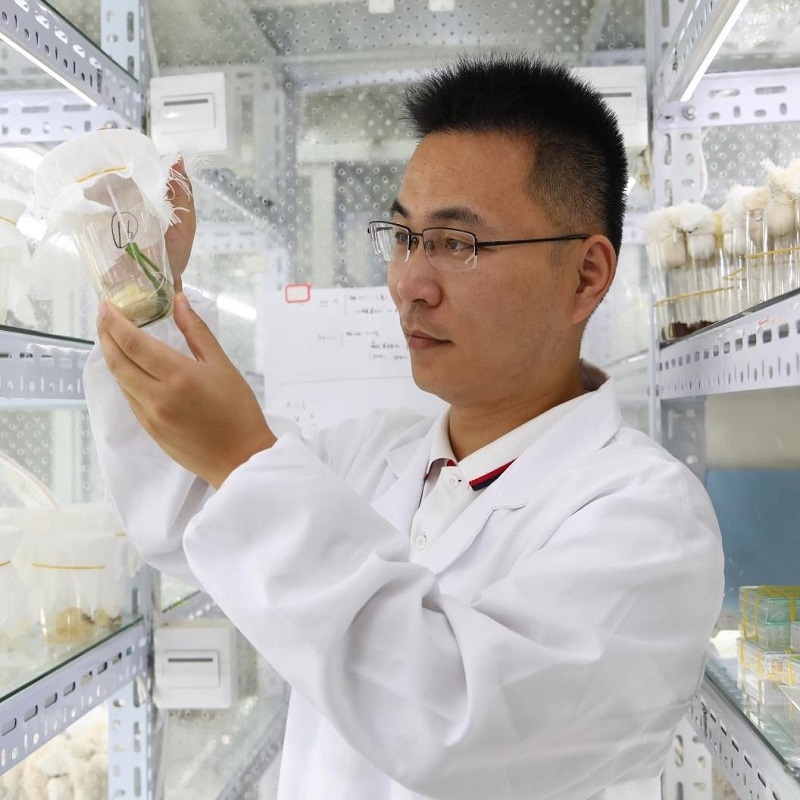Royal Society author Dr Yutao Xiao tells us about his research, his Newton International Fellowship award, and a successful collaboration between the Agricultural Genomics Institute at Shenzhen, Chinese Academy of Agricultural Sciences (AGIS-CAAS) and Lancaster University.

The Newton International Fellowship Scheme selects the very best early career postdoctoral researchers from all over the world, and enables them to work at UK research institutions for two years. Fellowships are made available by the Royal Society, British Academy and Academy of Medical Sciences. Dr Yutao Xiao, from the Agricultural Genomics Institute at Shenzhen, Chinese Academy of Agricultural Sciences (AGIS-CAAS), is due to commence a two-year Fellowship from 1 September. He is also an author of a review paper published in Philosophical Transactions B.
Tell us a bit about yourself and your area of research
I have worked at AGIS-CAAS since 2016. Generally, I am interested in agricultural insects and pest control, especially in Bt toxins and pesticide resistance mechanisms of target pests by molecular biology and genomics. By using RNA sequencing methods and RNAi, I have found several genes have important roles in Bt resistance mechanisms. I also found that structural variation of ABCC2 gene and Cadherin in cotton bollworm (Helicoverpa armigera) resulted in Bt resistance. Interestingly, the mutation of ABCC2 gene led to negative cross-resistance to abamectin, another biopesticide. Recently, I also studied the resistance of fall armyworm to pesticides and Bt through bioassay and genomic analysis.
Who or what inspired you to get involved in the field?
In 2006, I entered Professor Lou Yonggen's laboratory at Zhejiang University to carry out research on the interaction mechanism between rice and plants, and gradually realized the important significance of this field for agricultural production. In 2012, after I received my PhD from the university, I joined the team of academician Wu Kongming at the Institute of Plant Protection, Chinese Academy of Agricultural Sciences as a postdoctoral researcher, mainly engaged in Bt resistance mechanism analysis of cotton bollworm. Professor Lou Yonggen and academician Wu Kongming have exerted a profound influence on me over this time.
How did you hear about the Newton International Fellowship Grants?
The Newton International Fellowship Scheme enjoys a high reputation across the world. In 2017, researcher Xu Pengjun, who used to work in the same laboratory as me, successfully applied for a Fellowship and worked in Professor Kenneth Wilson's laboratory in Lancaster University. Since then, I began to pay attention to the scheme and I am pleased that I was able to successfully apply for a grant this year. My award is due to commence on 1 September, it will last for two years and I will also be based at Lancaster University. At this time, however, due to the COVID-19 outbreak, I am not sure if I will be able to start on the planned date.
How does the UK (Lancaster) and China (AGIS-CAAS) collaboration work?
In early February 2018, I visited Lancaster University and established a good relationship with Professor Wilson, and we have corresponded and collaborated ever since. On 13 June 2018, Professor Wilson and some of his team visited AGIS-CAAS at my invitation. It was a highly successful trip and the Director of AGIS-CAAS awarded a letter of appointment of Honorary Professor to Professor Wilson. The two sides expressed their strong intention to cooperate in scientific research and training of young researchers. In November that year, I visited Professor Wilson's lab again and we discussed the potential for me to conduct research in his laboratory to get more training in host-parasite interactions, and this Fellowship enables me to do that. Later, in 2019, we also collaborated on genome sequencing and pesticide resistance site scanning of the major invasive pest, the fall armyworm, and this research will soon be published.
You were one of many Chinese authors who contributed to an issue of Philosophical Transactions B in January 2019. Can you tell us how you came to be involved in this?
The special issue Biotic signalling sheds light on the smart pest management was organized by academician Kang Le of the Chinese Academy of Sciences. My postdoctoral advisor Wu Kongming, who is renowned for his expertise in the field of Bt crop and insect interaction, was invited by Kang Le to publish a review paper in the issue, Recent progress in the interaction between insects and bacillus thuringiensis. I am a main member of his team and therefore a co-author of the paper.
How do you see research in your field progressing?
At present, although some achievements have been made in integrated pest control research, chemical pesticides still play an important role in insect control. With the increasing attention on environment and food safety, green pest prevention and control has attracted more and more attention. More in-depth analysis of resistance molecular mechanism is the basis of green prevention and control, and the development of genomics provides an important technical means for the in-depth resistance mechanism. Therefore, it will be an important research direction and trend to use insect genome sequencing and resequencing technology and bioinformatics method to analyze the genome evolution mechanism of insect pesticide resistance.
What tips would you give someone who wanted to follow in your footsteps?
The level of agricultural development in different parts of the world is still very uneven and has great potential for improvement, including in the field of pest and disease control. I strongly encourage young people to devote themselves to agricultural development research, if you are really interested in it, because it is very meaningful work. However, the achievement of scientific research has never been easy, and agricultural research is no exception. Researchers need to invest a lot of time and energy, as well as confidence, patience, and perseverance. But I believe all the hard work will be worth it. Finally, I strongly recommend that young researchers seek opportunities to participate in international cooperation and exchange programs to broaden their horizons in their research field.
The Newton International Fellowships are for non-UK scientists who are at an early stage of their research career and wish to conduct research in the UK. The scheme is expected to re-open for applications in January 2021. The Society’s Research Fellowships are for researchers currently based in the UK or looking to relocate their research to the UK. All opportunities for Research Fellowships can always be found on our Grants, Schemes and Awards pages.





